On 5-6 February 2024, United for Efficiency (U4E) took part in the second of a new series of Twinning Workshops, convened by UNEP OzonAction and funded through the Montreal Protocol’s OzonAction Compliance Assistance Programme.
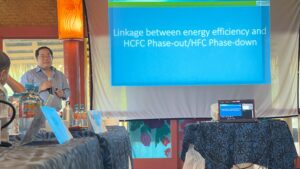 The joint Twinning Workshop for Pacific Island Countries Ozone Officers, Energy-Efficiency Policy Makers, and Financial Mechanisms Focal Points to Support Kigali Amendment Objectives was held in Rarotonga, Cook Islands and was attended by representatives of 14 Pacific Island Countries (PICs) – Cook Islands, Fiji, Kiribati, Marshall Islands, Micronesia, Nauru, Niue, Palau, PNG, Samoa, Solomon Islands, Tonga, Tuvalu and Vanuatu.
The joint Twinning Workshop for Pacific Island Countries Ozone Officers, Energy-Efficiency Policy Makers, and Financial Mechanisms Focal Points to Support Kigali Amendment Objectives was held in Rarotonga, Cook Islands and was attended by representatives of 14 Pacific Island Countries (PICs) – Cook Islands, Fiji, Kiribati, Marshall Islands, Micronesia, Nauru, Niue, Palau, PNG, Samoa, Solomon Islands, Tonga, Tuvalu and Vanuatu.
The workshop’s objective was to facilitate the twinning of National Ozone Officers and energy policymakers for energy efficient and climate friendly cooling and support policymakers to unlock the multiple co-benefits of working together on policies to transition to climate-friendly refrigerants under the framework of the Kigali Amendment to the Montreal Protocol while promoting the energy efficiency of air conditioning and refrigeration technology and alternative cooling solutions. Financial mechanism focal points from each country also took part to help understand how to unlock financing for agreed policy development and implementation.
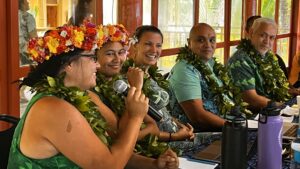 The discussions at the workshop underscored the significance of advocating for integrated environmental policies, mandating energy efficiency standards in building codes, endorsing energy-efficient procurement guidelines, addressing unique challenges, and enhancing collaboration among National Ozone Officers and National Energy Focal Points. The recommendations from the workshop reflect a comprehensive approach aimed at mitigating the environmental impact of refrigeration and air conditioning systems while promoting energy efficiency and reducing greenhouse gas emissions.
The discussions at the workshop underscored the significance of advocating for integrated environmental policies, mandating energy efficiency standards in building codes, endorsing energy-efficient procurement guidelines, addressing unique challenges, and enhancing collaboration among National Ozone Officers and National Energy Focal Points. The recommendations from the workshop reflect a comprehensive approach aimed at mitigating the environmental impact of refrigeration and air conditioning systems while promoting energy efficiency and reducing greenhouse gas emissions.
By implementing the recommendations, PICs can pave the way for significant progress in achieving their national sustainability goals and commitments under international agreements such as the Montreal Protocol and the Paris Agreement. Furthermore, the collaborative efforts fostered through this workshop highlight the collective commitment of Pacific nations to address environmental challenges and promote sustainable development.
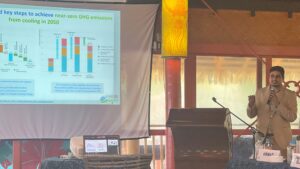 In support of the energy efficiency aspects of the workshop, U4E’s Saikiran Kasamsetty provided an overview of the U4E tools that are available, such as such as the model regulations for air conditioner and refrigerators, the updated U4E Country Savings Assessments and product registration system guidance notes, along with practical examples of their implementation.
In support of the energy efficiency aspects of the workshop, U4E’s Saikiran Kasamsetty provided an overview of the U4E tools that are available, such as such as the model regulations for air conditioner and refrigerators, the updated U4E Country Savings Assessments and product registration system guidance notes, along with practical examples of their implementation.
In discussing the opportunities for the Pacific region, it was noted that to achieve ambitious Minimum Energy Performance Standards and Labelling for cooling products, a concerted effort is necessary to provide technical support and capacity building for various stakeholders. Additionally, the development of new labels that integrate both energy efficiency and refrigerant information will enhance consumer awareness and choice and a robust legislative framework is also essential to regulate and monitor the ban of used, inefficient, or high GWP products to ensure a sustainable and environmentally responsible market for cooling appliances.
It was considered by the participants that the U4E prototype product registration system presents a valuable opportunity for countries without their own national product registration systems. The system is available free-of-charge to interested countries in the region, who were encouraged to reach out to U4E to participate in the programme.
For further information on the workshop, contact Saikiran Kasamsetty at saikiran.kasamsetty@un.org, or visit the OzonAction Meeting portal where all the materials from the workshop are available, along with the workshop report.
Leave a Reply